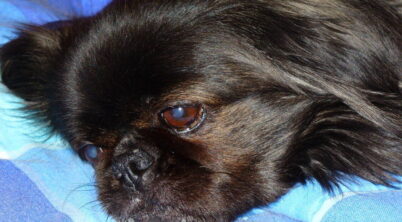Bad breath in dogs, known as halitosis, is a common concern for pet owners, and the Pekingese breed is not immune to this issue. This small dog, recognized for its lion-like mane and regal attitude, may suffer from bad breath due to various causes. While halitosis in dogs can result from dietary habits or oral hygiene problems, Pekingese dogs face certain breed-specific health challenges that may contribute to the condition.

The brachycephalic nature of the Pekingese, with their short noses and flat faces, can sometimes lead to dental issues. Their crowded teeth and the associated challenges in maintaining proper oral hygiene can create an environment conducive to the build-up of plaque and tartar, which in turn can lead to bad breath. Additionally, the Pekingese’s upper respiratory tract abnormalities may also promote the growth of bacteria in the mouth and respiratory system, potentially exacerbating halitosis.
Identifying the underlying cause of bad breath is vital for the welfare of a Pekingese. It’s necessary to rule out more serious health concerns that can manifest as halitosis, such as diabetes or kidney disease. Owners are advised to maintain regular veterinary check-ups and to stay vigilant about their Pekingese’s daily dental care routines to address or prevent the occurrence of bad breath.
Table of Contents
Understanding Pekingese Health
The Pekingese breed, with its distinctive flat face and short muzzle, is known for several breed-specific health concerns, particularly related to their respiratory system. The most notable is Brachycephalic Airway Obstruction Syndrome (BAOS), which stems from the brachycephalic nature of these dogs—meaning they have a broad, short skull.
Breathing Problems: Key respiratory issues in Pekingese include:
- Stenotic nares (small nostrils)
- Elongated soft palate
- Hypoplastic trachea (underdeveloped windpipe)
These anatomical peculiarities can cause labored breathing and lead to more severe complications.
Heart Disease: Due to their structure and potential for being overweight, Pekingese are also at risk for various heart conditions. Timely detection and regular veterinary care are crucial for managing these issues.
Obesity Risks: The Pekingese’s propensity for a less active lifestyle makes them susceptible to becoming overweight, further exacerbating respiratory and heart conditions. Maintaining an ideal weight is critical for their overall health.
Diabetes: This breed can develop diabetes, a condition that requires lifelong management. Regular health screenings can aid in early detection and treatment.
| Health Issue | Description | Prevalence in Pekingese |
|---|---|---|
| Brachycephalic Syndrome | Respiratory difficulty due to flat face | High |
| BAOS | Specific respiratory obstructions | Common |
| Heart Disease | Various cardiac conditions | Moderate Risk |
| Diabetes | Inability to regulate blood sugar | Present, Manageable |
| Obesity/Overweight | Excess weight impacting overall health | Common |
By understanding these health risks, Pekingese owners can be vigilant and proactive about their pet’s health, ensuring a better quality of life for their loyal companions. Regular veterinary check-ups and an appropriate lifestyle are key.
Oral Health and Bad Breath
Oral health is a critical factor in preventing bad breath in Pekingese dogs. By understanding the underlying causes and embracing adequate preventative measures, owners can maintain their pet’s oral hygiene.
Causes of Bad Breath
Halitosis, the medical term for bad breath, frequently results from dental issues such as the buildup of plaque and tartar on a Pekingese’s teeth. This buildup can host bacteria that produce foul odors.
- Plaque: A sticky film composed mainly of bacteria accumulates on the teeth.
- Tartar: Hardened plaque that firmly attaches to teeth and can lead to periodontal disease.
- Periodontal Disease: Inflammation and infection of the ligaments and bones that support the teeth.
Periodontal disease is a prevalent condition in dogs and a common cause of persistent bad breath. Left untreated, it can result in tooth loss and has been linked to broader health issues.
Prevention and Dental Care
Preventative measures are essential for maintaining your Pekingese’s oral health and avoiding the onset of bad breath. Regular teeth cleaning practices include:
- Daily Brushing: Utilize canine toothpaste specifically designed for dogs.
- Professional Cleaning: Veterinarians can perform thorough cleaning to remove plaque and tartar.
Dental Care is not just about dealing with existing problems; it involves continuous care and routine practices. Establishing a dental hygiene routine can significantly reduce the risk of bad breath associated with dental problems in Pekingese dogs.
Diet and Exercise
The right balance of diet and exercise is critical in managing a Pekingese’s bad breath, which can be exacerbated by obesity and dietary indiscretions.
Feeding a Balanced Diet
A balanced diet is essential for a Pekingese. It should provide all the necessary nutrients without promoting weight gain. High-quality dog food that meets the AAFCO nutritional standards is recommended. Reduce the risk of bad breath by incorporating safe dental chews and crunchy foods that help clean teeth. Always ensure fresh water is available to aid in digestion and oral hygiene. Here are some key dietary considerations:
- Protein: Essential for muscle maintenance.
- Fiber: Helps with digestion and can reduce flatulence.
- Carbohydrates: Should be given in moderation to prevent obesity.
- Vitamins and Minerals: Crucial for overall health; can be affected by toxins if the diet includes harmful human foods or plants.
It’s important to avoid foods that can cause bad breath or are toxic to dogs, such as onions, chocolate, and certain sweeteners like xylitol.
Exercise Needs and Limitations
The Pekingese breed has specific exercise needs due to their brachycephalic nature. While exercise is vital for weight management and overall health, it is crucial to understand their limitations. Heavier exertion can lead to breathing difficulties, so exercise should be:
- Moderate: Short walks in cool weather to prevent overheating.
- Regular: Daily activity to maintain a healthy weight.
- Monitored: Watch for signs of distress or labored breathing.
Regular grooming also plays a role in a Pekingese’s health by identifying early signs of skin issues that could affect their exercise routine and overall comfort.
When to Seek Medical Attention
Pekingese owners should be vigilant in noticing changes in their dog’s breath, as it can be an indicator of underlying health issues. Persistent bad breath should prompt a vet visit.
Symptoms to Watch For
Monitor your Pekingese for the following symptoms in conjunction with bad breath, as they may signal a need for medical attention:
- Vomiting or Gagging: Occasional instances might not be alarming, but repeated episodes warrant a vet check.
- Loss of Appetite: A significant decrease in eating can indicate dental or internal organ issues.
- Respiratory Changes: Be aware of rapid breathing, wheezing, panting, or snoring that’s new or excessive.
- Behavioral Changes: Look for signs of lethargy or a decrease in activity levels.
- Oral Discomfort: Signs include sneezing, mouth breathing, or reluctance to chew toys.
Diagnostic Procedures
Upon visiting the vet, expect the following potential diagnostic methods:
- Physical Examination: Checking for signs of inflammation, oral diseases, or other physical symptoms.
- X-Rays: Imaging can identify issues like periodontal disease or check liver and kidney functioning which, if compromised, could cause halitosis.
- Lab Tests: Blood work might be necessary to assess the dog’s overall health and diagnose conditions such as liver or kidney disease.
- Medications: Depending on the diagnosis, your dog may need a specific medication or even surgical interventions.
Proper diagnosis and timely treatment can greatly improve your Pekingese’s health and quality of life.
Living with a Pekingese
When selecting a Pekingese from a breeder, prospective owners should inquire about the puppy’s health screenings and the steps taken to ensure they aren’t prone to conditions typical of the breed, such as tracheal collapse and upper airway obstruction. It’s important to recognize that Pekingese dogs often exhibit distinctive breathing sounds like snorting and coughing due to their brachycephalic nature.
Maintaining a quality diet and providing proper grooming are essential aspects of living with a Pekingese. Their dietary needs must be carefully monitored to prevent obesity, which can exacerbate breathing difficulties and lead to exercise intolerance. Grooming not only involves maintaining their luxurious coat but also entails regular dental treats and chew toys to help mitigate bad breath and support oral health.
Exercise should be appropriate for their capacity, avoiding excessive exertion which may trigger breathing issues or collapse. Pekingese can enjoy a calm, relaxed lifestyle, with play tailored to their energy levels and physical capabilities.
| Health Considerations for Pekingese Owners | Suggestions |
|---|---|
| Breathing Issues | Avoid strenuous exercise, monitor for signs of distress |
| Dental Health | Provide dental treats, schedule regular veterinary checkups |
| Gastrointestinal Problems | Ensure a balanced diet, be aware of any changes in appetite or digestion |
| Skin and Ear Health | Regular grooming, be alert to signs of allergies or infections |
| General Health and Wellbeing | Regular veterinary visits, consider radiographs to detect any underlying issues |
Owners should be watchful for indications of gastrointestinal problems, allergies, ear infections, and skin infections, all of which can occur in Pekingese. Early detection and treatment are crucial for managing these conditions effectively. Regular veterinary checkups, including radiographs when necessary, play a significant role in the ongoing health maintenance of these unique dogs.








